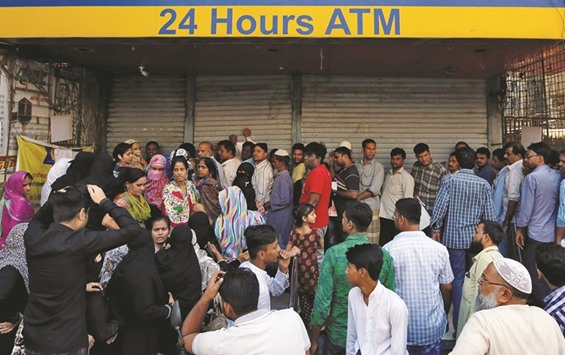Prime Minister Narendra Modi’s surprise decision to scrap high-value banknotes has upset preparations for next year’s budget because of the resulting disruption to growth, revenues and asset sales, two government sources said.
Modi scrapped Rs500 and 1,000 banknotes on November 8 in a bid to flush out cash earned through illegal activities, or earned legally but never disclosed to the taxman.
Officials fear the move will slow economic activity for much longer than originally expected, as millions of people continue to queue at banks and ATMs for cash and companies struggle to pay wages and suppliers.
“We had thought the demonetisation will be a game changer,” said one official, who has direct knowledge of budget preparations, adding the central bank should have taken more steps to ease the pain of ordinary people.
“We still have to start work on the budget.”
Finance Minister Arun Jaitley is expected to present the annual budget for 2017/18 on February 1.
The official said the cash crunch had hit sectors like construction, agriculture and auto makers, hurting tax receipts and complicating the government’s asset divestment programme.
Two-wheeler and commercial vehicle sales declined by over 10% in November from a year ago, with weakness in the retail, gems and jewellery sectors also impacting factory gate duty receipts.
The government is likely to miss its annual target of raising Rs565bn ($8.4bn) through the sale of stakes in companies by a wide margin due to uncertainty in the markets, said the official.
The government has so far raised less than half of the target for the whole fiscal year.
N R Bhanumurthy, an economist at National Institute of Public Finance and Policy (NIPFP), a government-funded think tank, said revenue collections could fall by up to Rs350bn ($5.18 bn) this year.
“We are facing very uncertain times,” said Bhanumurthy. “The government should weigh the impact of demonetisation on growth and revenue.”
Another finance ministry official said economic growth for the current fiscal year to March 2017 could fall below the Reserve Bank of India’s revised estimate of 7.1%, putting pressure on fiscal deficit targets.
The federal government has partially deferred a hike in wages of its 10mn employees and pensioners to cut its spending bill.
Jaitley, however, still hopes to hit his deficit goal of 3.5% of gross domestic product in the current fiscal year, said a source familiar with his thinking.
The RBI has dashed hopes of a windfall of nearly $15bn based on expectations that up to 30% of the black cash would expire worthless, enabling it to pay a one-off dividend to the government.
In the event, over 80% of the old notes have already been deposited ahead of December 30 deadline to deposit them at the bank.
Finance ministry officials estimate that only 5-10% of the cash will expire worthless, raising questions over whether the entire exercise - billed as an attack on illicit black cash - was justified.
Meanwhile, former prime minister Manmohan Singh said in remarks published yesterday that people should be ready to face “a tough period over the coming months” due to the demonetisation.
Writing in The Hindu newspaper, the Congress leader also said the November 8 decision would cause grievous injury to the honest Indian while those with black money will escape with a mere rap on the knuckles.
The economist-turned-politician described as “impetuous” Modi’s move to ban the high denomination notes and warned that this would cause severe hardships to ordinary Indians.
It has “shattered the faith and confidence that hundreds of millions of Indians had reposed in the government of India to protect them and their money”, Singh said.
Singh, who was the finance minister when India unleashed economic reforms in 1991, said Modi’s stated intentions behind the note ban - fighting fake currency as well as corruption and black money - were honourable.
“However, the popular saying ‘the road to hell is paved with good intentions’ serves as a useful reminder and warning in this context.”
Singh underlined that all cash was not black money and all black money was not hoarded in cash.
“More than 90% of India’s workforce still earn their wages in cash. These consist of hundreds of millions of agricultural workers, construction workers and so on.”
He said that more than 600mn people still lived in towns and villages with no bank and cash was the bedrock of their lives.
“To tarnish these as ‘black money’ and throw the lives of these hundreds of millions of poor people in disarray is a mammoth tragedy.”

People queue outside a bank to withdraw cash and deposit their old high denomination bank notes in Mumbai.
